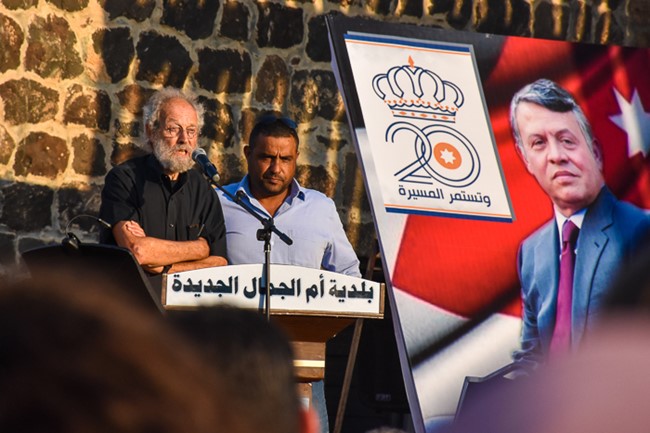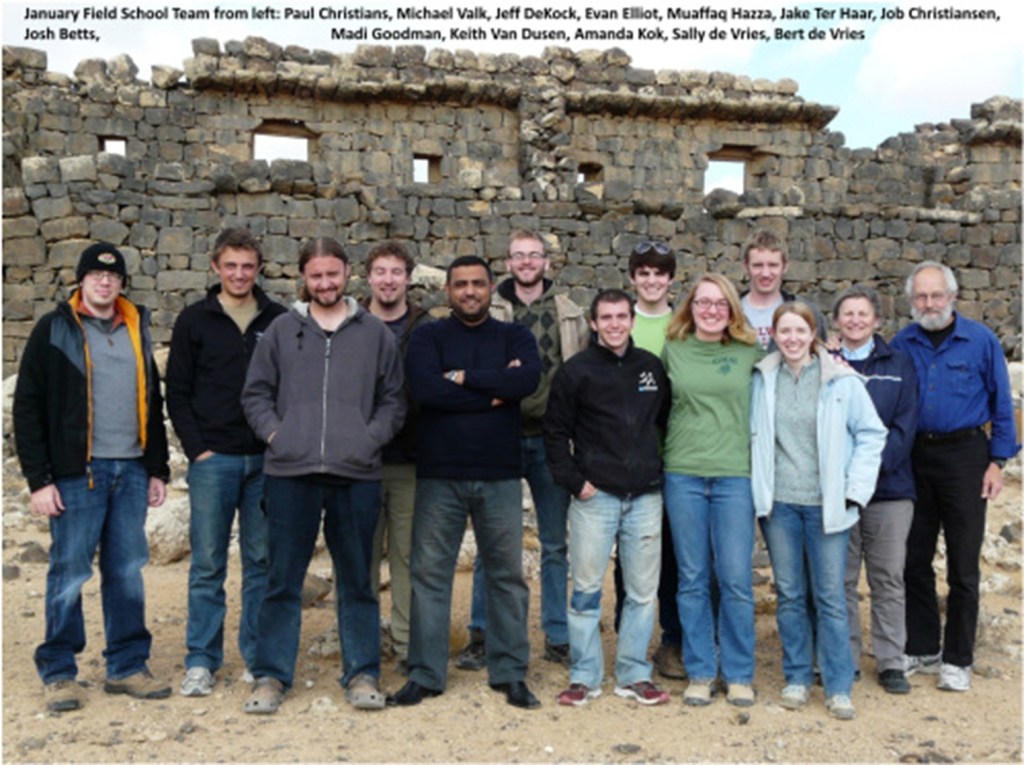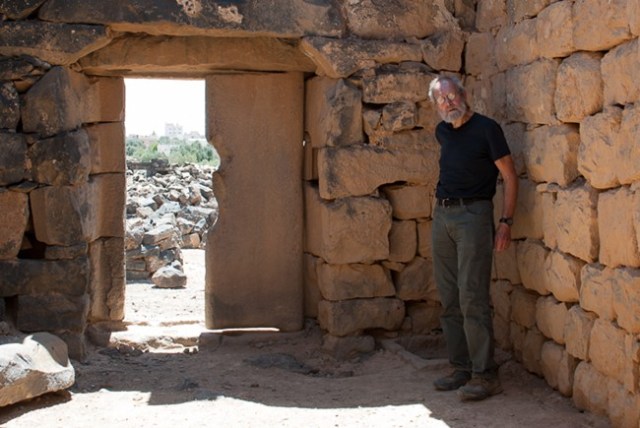Our department mourns the sudden passing on March 28, 2021 of Professor Emeritus Bert de Vries, our deeply beloved and longest-serving colleague. A Calvin alumnus (’60), Bert returned to Calvin in 1967, after graduate study at Calvin Seminary and Brandeis University, and taught in the History Department for forty-six years. An invitation to collaborate on a dig at Tall Hisban in Jordan in 1968 inspired him to turn his talents to archaeology. He created Calvin’s Archaeology minor, which remains a vital part of Calvin’s History program. Despite his formal retirement in 2013, Bert remained a dynamic force in our department and in the lives of countless colleagues, collaborators, and former students, who are deeply saddened by his loss.
Bert’s ongoing archaeological and heritage work centered on Umm el-Jimal, Jordan, a two-millennia old site that was little known when he began to map surface remains there in 1972. His work there expanded steadily into the Umm el-Jimal Archaeological Project (UJAP), a multi-disciplinary international venture that combines archaeological excavation, survey, and education with cultural preservation, sustainable tourism, and digital outreach. Bert took generations of Calvin history and archaeology students to Umm el-Jimal, and today’s students continue to join the UJAP and experience the wonderful culture of Jordan. In 2017 the UJAP began an ongoing partnership with Calvin’s Clean Water Institute, reactivating the site’s ancient water system in order to relieve the current water crisis. Bert served as the UJAP’s general director to the end, spending much of his time on the site coordinating with the site’s local administrators, contributing frequently to the Umm el-Jimal blog, overseeing the creation of the on-site Interpretive and Hospitality Center, supporting the launch of Hand by Hand Heritage (a locally owned heritage tourism company), and writing the Site Management Plan to support the Jordanian government’s nomination of Umm el-Jimal as a UNESCO World Heritage Site. Professor Darrell J. Rohl, Bert’s successor at Calvin, has served as the project’s Director of Excavations since 2019, working alongside Bert and the diverse international team that Bert cultivated.
Bert was a skilled archaeologist, technical illustrator, and administrator. But his greatest passion for history and archaeology grew out of his deep love for people. He practiced and preached community archaeology or “inclusive archaeology,” which he explained is a corrective to the older practices of European archaeologists who saw non-Western peoples as less capable of interpreting and preserving their own cultural heritage. Bert believed and strove to ensure that the people of the Middle East should be the curators of their own history. Fluent in Arabic, he and his wife Sally formed deep friendships with the people of Umm el-Jimal, who lovingly call them “Abu Butros” and “Umm Butros,” and with many other Jordanian and Arab colleagues. They served in Jordan from 1988 to 1991 as director and administrative director, respectively, of ACOR (American Center of Research). Bert always downplayed his own role in creating and sustaining UJAP, yielding the spotlight to his Jordanian colleagues whenever he could. He and Sally have been passionate advocates and ambassadors for Middle Eastern culture and for peace, understanding, and compassion. In 2009, together with Prof. Doug Howard, Sandy Howard, and other local colleagues and collaborators, Bert and Sally helped to found Healing Children of Conflict in West Michigan. Both worked hard to raise funds and awareness for the large community of Syrian refugees living near Umm el-Jimal, and helped to create educational programs to foster social cohesion between refugees and the host community. Bert spoke and wrote frequently about Middle Eastern affairs, always from a deeply humane perspective as a Christian pacifist. In 2019 the government of Jordan recognized Bert’s many contributions by awarding him its highest civilian honor, the King Abdullah Medal of Excellence.

At age 82, Bert had accomplished far more than a lifetime’s work, but he still had the dynamism of a much younger man. He leaves many tasks unfinished, but also many collaborators who will be proud to carry his work forward. He is survived by Sally, by his four children—Tara Cahill (Calvin ‘85), Tanya Bulthuis (Calvin ’86), Jenna Morton (Calvin ‘88), and Guy De Vries (Calvin ’90)—and by ten siblings and fifteen grandchildren. Bert, words cannot express how much your friends and colleagues here at Calvin miss you and how indebted we are to you for your life of service, scholarship, friendship, and Christian witness.

Bert de Vries 
Bert de Vries leading a tour at Umm el-Jimal, Jordan. Image source: The Umm el-Jimal Project. 
Bert de Vries in Jordan. Image source: Darrell J. Rohl. 
Bert de Vries with Muaffaq Hazza, Umm el-Jimal Field Director. Image source: Darrell J. Rohl. 
Bert and Sally (back row on the right) with a January Field School at Umm el-Jimal.





You will be greatly missed in Jordan , God bless you and your family
LikeLike
Pingback: Peace Through Understanding: The Life of a Christian Scholar - Kristin Kobes Du Mez
Pingback: Whatever happened to the Calvin School of Christian Historiography? – Historical Horizons
I will not forget you until I meet you, no one is immortal
LikeLike